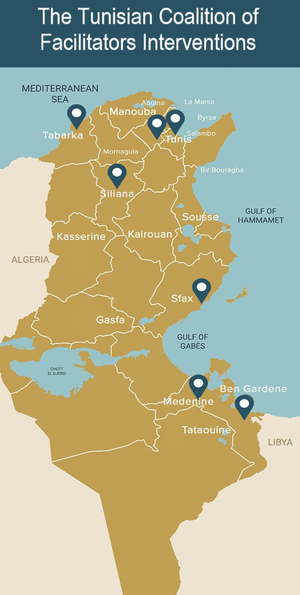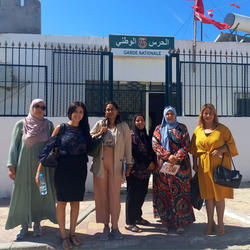The Current Situation in Tunisia
A USIP Fact Sheet
Tunisia’s transition to democracy remains incomplete and under stress. Since the presidential measures to suspend the parliament, dismiss the government and draft a new constitution were enacted in 2021, socioeconomic conditions have continued to deteriorate, and risks of unrest have increased. Meanwhile, the ambitions of the 2011 revolution for rule of law, accountability, economic prosperity and human dignity are far from being realized. USIP works with Tunisians to improve national and local governance and security, rebuild trust and strengthen civil society.
USIP’S Work
USIP works directly with the Tunisian government and civil society to improve governance, manage conflict, implement security sector reforms, rebuild trust between citizens and the state, and help create conditions more conducive to a democratic transition. The Institute also conducts research that informs future programs, analyzes ongoing efforts and helps develop new approaches to peacebuilding in Tunisia. From its offices in Tunis and Washington, D.C., USIP convenes thought leaders, government officials and international visitors.
Localized Peacebuilding Processes with National Impact
Drawing from its pioneering work in conflict resolution and violence prevention, USIP established the Tunisian Coalition of Facilitators (TCF) in 2014. Together, USIP and the TCF develop and implement field-tested inclusive governance, mediation, and reconciliation processes in locations across the country where conflicts have national and international implications. The TCF includes national and local peacebuilders who understand local conflict dynamics. USIP empowers these leaders to resolve underlying conflicts that affect community and national stability. Examples of the TCF’s peacebuilding work include:
Douar Hicher: In this marginalized community, a heavy-handed response by security forces to high levels of violent extremist recruitment has contributed to the community’s fragility. USIP and TCF are building resilience by empowering women from the community to reintegrate families who have been alienated and stigmatized due to ties with extremists. Fifteen of the women have become active leaders in their community and are now addressing drivers of radicalization in collaboration with local authorities and security forces.
Medenine: In this southern border region, TCF addresses a major trigger of conflict in Tunisia: the historically violent relationship between youth and security forces. USIP and TCF have led a reconciliation process that culminated in the creation of a sustainable conflict mediation unit (CMU). Since 2020, the CMU has pro-actively prevented the escalation of eight emerging conflicts between security officers and youth from marginalized neighborhoods.
Supporting Community-Focused Policing
Internal security forces are on the front lines of Tunisia’s political transition. They are critical to protecting communities and deepening their trust in government after decades of authoritarian rule. To sustain Tunisia’s democratic institutions, the nation’s security forces need to become inclusive, citizen-centric, skilled in handling emerging security challenges such as unrest and violent extremism, and proactive in institutionalizing reforms.
With these objectives in mind, USIP is working closely with the National Guard and National Police on the complex process of overhauling their training systems to help create a more professional, accountable, and public-service-oriented institution.
Building Institutional Capacity to Support Regional Peace and Stability
In light of Tunisia’s ambition to play a larger role in promoting regional peace and stability, the government issued a decree in 2019 to expand the diplomatic training academy’s mandate and carry out comprehensive reform in the training program to better prepare diplomats with the skills to meet the evolving challenges facing their region and the world. Given USIP’s extensive expertise and experience in international conflict resolution and mediation, as well as its long history of training partnerships with government institutions, the Institute is working in partnership with the Tunisian government to help the academy achieve its new mandate in supporting regional peace and stability. USIP is primarily focused on supporting curriculums in conflict management and mediation, thematic expertise of lead instructors, pedagogical approaches, research and thought leadership, and strategic and operational planning.
Strengthening Local Environmental Governance in Tunisia
Environmental degradation amid rapid onset climate change has become a major threat to the country’s stability. Mismanagement of natural resources and longstanding infrastructure problems in critical areas like water and sanitation, waste management and industrial pollution have imperiled citizens’ livelihoods, health and well-being. In marginalized communities, these pervasive issues have become significant drivers of internal displacement, social unrest and violence. Building on successes in multi-stakeholder problem-solving approaches in conflict-prone regions, USIP has launched a pioneering and adaptive new initiative which will support government, civil society and other relevant stakeholders to co-develop and implement solutions to environmental governance challenges that are exacerbating fragility and heightening exposure to climate shocks.
|
Fifteen women, who have family ties with extremism, used USIP training on dialogue, peacebuilding and prevention of violent extremism to become active leaders in the community engaging government and security forces to address root causes of violence and extremism. In Medenine, near the Libyan border, the conflict mediation unit (CMU) has prevented the escalation of eight emerging conflicts between youth and security officers since 2020. |





